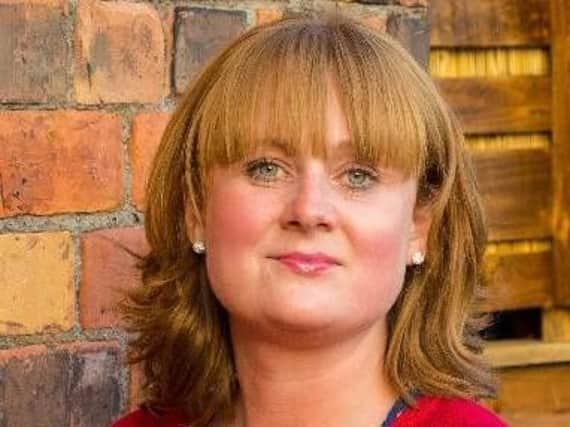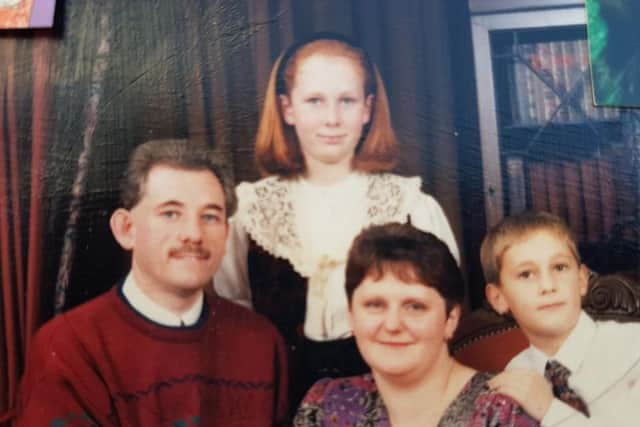Call for justice from families of victims of the contaminated blood scandal in Lancashire as inquiry begins


The blood transfusion scandal saw about 4,800 people with haemophilia infected with hepatitis C or HIV in the 1970s and 1980s.
Paula Wakefield’s beloved dad Russell Carbery was one of the 2,000 who died aged only 39 of Hep C after being infected by contaminated blood products.
Advertisement
Hide AdAdvertisement
Hide AdPaula, 39, was 13 when she and her brother Stuart, who was just 10, lost their father in an untimely death.


She says that the Government must be held to account but it was also the stigma around HIV at the time which meant the scandal was hushed up and not brought into the light when it should have been.
Paula, who lives near Wigan, says: “My dad had the inherited blood disorder haemophilia and through contaminated blood products meant to treat the condition, he contracted HIV and hepatitis B and C.
“It was the early 1980s when my dad first found out he had HIV and he only found out he had hepatitis C shortly before he died.
Advertisement
Hide AdAdvertisement
Hide Ad“He was getting ill and suffering but no one was diagnosing him.
“I remember my dad started taking drugs called AZT and after hearing about these on the news, I realised he must have HIV.
“There was a real stigma about HIV and haemophilia at the time and although my mum and dad tried to protect me and my brother from it all, I later discovered my parents received hate mail and death threats.
“I didn’t understand too much at the time but I was aware I should not talk about my dad having HIV.”
Advertisement
Hide AdAdvertisement
Hide AdRussell, who used to work in local government before having to take medical retirement, deteriorated rapidly and went into a coma.
Paula recalls: “My dad became very jaundiced and lost lots of weight and became very gaunt looking.
“The whole family was heartbroken when he died.”
Now, 26 years later, an inquiry into the scandal, expected to last at least two years, has commenced.
Paula, a councillor in Wigan, said: “It’s very surreal that it’s got to this point. I was at the beginning of the inquiry last year.
“It’s fantastic that it has started.
Advertisement
Hide AdAdvertisement
Hide Ad“The stories that you have known all along - to know that people are now having the opportunity to tell their stories in the inquiry is great. Hopefully people are now going to start hearing evidence.
“They will be horrified to hear what happened.
“It’s been a massive campaign to get to this point. I have been involved since my dad was still alive. We used to go to Westminster and lobby MPs.
“My dad’s brother Harvey Carbery also had haemophilia and he died as well. My Dad died of hepatitis C. Because haemophilia is genetic they both had the same treatment and they both died.”
Asked what she thought instigated the inquiry, Paula said: “I think the turning point was when the Freedom of Information requests (FOI) started coming out about it four years ago. It started to get a high profile and what started to get more national coverage.”
Advertisement
Hide AdAdvertisement
Hide AdAccording to campaign group Tainted Blood in the 1970s and 80s around 4,800 British haemophiliacs were infected with Hepatitis C through treatment with pooled blood factor concentrates, made from tens of thousands of units of blood imported from abroad where people were paid to donate.
The UK relied on blood product imports from the US, many of which were manufactured from blood plasma from thousands of paid donors including from high risk people such as prisoners and drug addicts.
The Factor VIII treatment used by haemophiliacs was affected by the contaminated blood.
Campaigners say there is evidence the health service knew the blood was contaminated but carried on giving it and there have been allegations of a cover-up.
Advertisement
Hide AdAdvertisement
Hide AdActivists say a haemophiliac would have been exposed to the blood of millions of donors, making infection a certainty. 1,243 of those were also co-infected with HIV. More than 1,000, approximately 80 per cent of those have died, many within five years. Those remaining must take toxic anti-viral drugs daily for the rest of their lives in an attempt to ward off full-blown AIDS.
Paula says that in a speech the Mayor of Greater Manchester Andy Burnham compared the contaminated blood scandal to the Hillsborough disaster.
She said: “The reason it hadn’t had the same coverage as Hillsborough is because it happened over many years and because of the stigma that is attached to HIV with drugs and aids.
“People are shocked when they hear it’s not been sorted. It’s been a long, drawn out process. The government has made it about money rather than getting to the crux of the problem finding out what happened. There’s got to be someone who is liable.
Advertisement
Hide AdAdvertisement
Hide Ad“It’s something you didn’t talk about publicly. We were told to tell people at school that dad had died of cancer.”
Paula says that somehow parents of her classmates at school got wind of the fact her dad had HIV and threatened to take their children out of school because of it.
“We lost a lot of friends,” she said, “In the 90s my mum had funeral after funeral. Dad died in 93 that’s when a lot of people were dying of Hep C.
“He had been tested for Hep C but had never been told that he had it but that was not unusual.
Advertisement
Hide AdAdvertisement
Hide Ad“We never got to tell our stories. We’ve got to get to the bottom of why it happened and who is responsible.
"Who gave the orders to keep on giving Haemophiliacs this treatment?
“Instead of giving someone a better quality of life it killed them.
“The rhetoric has always been that there was nothing more that could be done but we know that more could have been done at the time.
"It should never have happened.”